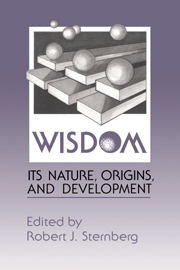Book contents
- Frontmatter
- Contents
- List of contributors
- Preface
- Part I Approaches to the study of wisdom
- Part II Approaches informed by philosophical conceptions of wisdom
- Part III Approaches informed by folk conceptions of wisdom
- Part IV Approaches informed by psychodevelopmental conceptions of wisdom
- Part V Integration of approaches and viewpoints
- 14 The elements of wisdom: overview and integration
- Name index
- Subject index
14 - The elements of wisdom: overview and integration
Published online by Cambridge University Press: 05 June 2012
- Frontmatter
- Contents
- List of contributors
- Preface
- Part I Approaches to the study of wisdom
- Part II Approaches informed by philosophical conceptions of wisdom
- Part III Approaches informed by folk conceptions of wisdom
- Part IV Approaches informed by psychodevelopmental conceptions of wisdom
- Part V Integration of approaches and viewpoints
- 14 The elements of wisdom: overview and integration
- Name index
- Subject index
Summary
The purpose of this chapter is to provide an overview of the present volume and to begin to explore and integrate the use and concept of the term wisdom. In reviewing the preceding chapters, I find it refreshing to see a collection of analyses about wisdom. The long neglect by psychologists of the subject matter of wisdom is a curious fact that itself warrants attention, and it is here that we will begin.
The present authors reviewed histories of psychology, handbooks, overviews of psychology as a science, major textbooks, and selected works (e.g., Kantor, 1959; Koch, 1959) and determined that, indeed, the topic of wisdom was long neglected in psychology. For example, the massive handbook of general psychology edited by Wolman (1973) does not index the subject of wisdom: There is no mention of wisdom in the 45 chapters and over a thousand pages of text that describe the content of psychology. On the other hand, one of the elements of wisdom, reasoning, is well represented in selections of materials on experimental psychology (e.g., Stevens, 1951;Woodworth, 1938).
Among the factors that are likely to have contributed to psychology's neglect of the study of wisdom was the association of the subject to philosophy. This association placed it off limits to the 19th- and early 20th-century empirically minded psychologists. Behaviorism, which dominated the mid-20th century of psychological investigation, abhorred the “mentalistic” connotations inherent in the study of wisdom.
- Type
- Chapter
- Information
- WisdomIts Nature, Origins, and Development, pp. 317 - 332Publisher: Cambridge University PressPrint publication year: 1990
- 91
- Cited by



